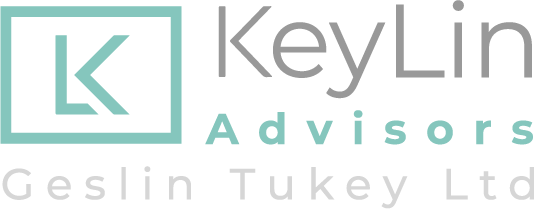Your Small Business Tax Questions Answered
We know that running a small business can be challenging — and that tax questions can be difficult to answer. Put them together, and it can be a recipe for confusion. But have no fear: KeyLin is here. With decades of experience on our team, we know your commonly asked small business tax questions because we’ve heard them before. That’s why we put together these FAQs: to answer your pressing questions and help you feel more confident for this tax season and all tax seasons to come.
Frequently Asked Small Business Tax Questions
As an all-in-one financial services provider, KeyLin hears a lot of questions, especially related to taxes. We’ve gathered 11 of the most common questions all in one place to answer them for you. It's all here, from filing small business taxes to paying self-employment tax.
What do I need to file my small business taxes?
What you need to file your small business taxes depends on the structure of your business. For example, a limited liability company, or LLC, with one member must file a Schedule C, which includes the owner’s personal 1040 form. To file, you will need records of the company’s income and expenses, assets and depreciations, and payroll, among other things. For more information on which forms you must file based on your business entity, contact a tax professional.
What expenses are deductible?
To be deductible, an expense must be both ordinary and necessary. That means it must be commonly used and widely accepted in your industry and required to run your business. Looking for specifics? We put together a checklist of small business tax deductions for which you may be eligible. From your bank fees to start-up expenses, we’ve covered 20 potential deductions for your review.
Should I make estimated tax payments?
Income that is payment for a service is considered taxable, whether or not taxes are removed from it. Plus, in the U.S., taxes are “pay as you go.” Therefore, estimated tax payments help individuals who do not have taxes consistently removed from their paychecks to keep up with their taxes. If you expect to owe more than $1,000 in taxes when you file, you should be paying estimated taxes, whether you’re an individual, a sole proprietor, a partner, or an S corporation shareholder.
Can I pay my personal expenses through my business?
No! Your personal expenses should stay separate from your business expenses for a host of reasons, including legality and ease of filing taxes. While we understand how tempting it may be to blur the lines between the two, they should stay separate.
When do I need to file my small business taxes?
Like what you need to have available to file, when your taxes are due depends on your business entity type. For individuals, sole proprietors, and C corporations, the deadline is the same — April 15 (typically — sometimes this changes due to the day of the week or holidays). For C corporations, you may pay quarterly, or estimated, tax payments, much like an individual might if they don’t have taxes removed from their paycheck. For S corporations and partnerships, the deadline is March 15. For a complete list of tax dates you should know, check here.
How does my business structure affect my taxes?
Your business structure, or entity type, affects your taxes in many ways. It affects how much you pay in taxes, how you file, and when you file, as well as your personal liability and how you raise money. Each type has benefits and drawbacks. For more information on each entity type and its pros and cons, view the resource above or contact us.
Do I need to pay self-employment tax?
Likely, yes. If your earnings from self-employment were $400 or more, you have to pay self-employment — and income — taxes. Self-employed individuals (sole proprietors, independent contractors, members of a partnership, gig workers, etc.) generally owe both types of taxes because they don’t have Social Security or Medicare taxes withheld from their paychecks. In this case, you may also owe estimated taxes, depending on how much you expect to owe throughout the year.
How can I minimize my tax liability?
Using a combination of tax planning and tax strategy can help you minimize your tax liability. Tax planning helps you reduce your tax liability for the year using things like deductions and credits, while tax strategy is a longer-term strategy that utilizes things like investments and tax-advantaged accounts to both minimize tax liability and generate wealth. In general, you will want to reduce your taxable income, maximize your tax deductions, and take advantage of tax credits to make the most of your tax season.
What are the tax implications of hiring independent contractors vs employees?
Generally, hiring an independent contractor or employee comes down to the role they fill rather than the tax implications. Employees fill capacity gaps, while contractors fill expertise gaps. However, the tax implications are different for each. For employees, you must withhold and deposit income, Social Security, and Medicare taxes, pay unemployment taxes, and carry workers’ compensation insurance. For independent contractors, you must have them complete a W-9; if they don’t provide you with a taxpayer identification number (TIN), you must withhold income tax from the independent contractor’s pay as “backup withholding.”
Do I need to collect sales tax?
This answer will depend on your state regulations. In Minnesota, if you have a taxable presence in the state — even as an out-of-state retailer or marketplace provider — you must collect sales tax in Minnesota. Sales tax applies to the sale of most retail goods and some services (with some exceptions).
How much should I save for small business taxes?
The exact amount you owe in small business taxes will depend on your business, entity type, and other unique factors. However, we recommend saving approximately 30% of your annual net income to cover federal and state taxes. We recommend saving throughout the year so you’re not blindsided when tax season comes.
Have More Questions? We Have Answers
We know we haven’t answered every possible small business tax question you may have, but don’t panic. We’re always available to answer your small business tax questions. As your one-stop shop for financial services, KeyLin is proud to offer tax preparation, tax planning, and tax strategy support for small businesses and individuals alike. From reducing your taxable income to ensuring everything is filed correctly and on time, we can help. For more information on our services — or to ask that pesky question we didn’t answer — schedule your free first consultation today

